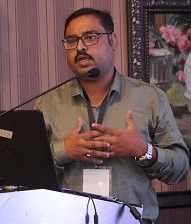Business Research (BBA)
Course Attendees
Still no participant
Course Reviews
Still no reviews
Code(Credit) : CUTM1217(4-0-2)
Course Objectives
This course of research methodology is for imparting the knowledge of different areas of research to the students. The course is concerned with systematic gathering and analysis of information needed either to understand or to solve a managerial problem or a phenomenon. The objective of the course is to sensitize students with an appropriate research design, several research techniques, to enable them to conduct investigations within and outside their organizations
Learning Outcomes
1. To get students acquainted with basics of research and to deliver theoretical knowledge of research methodology and its application in business world
2. To identify and enunciating the problem,
3. To formulating a hypothesis,
4. collecting the facts or data, analysing the facts and reaching certain conclusions either in the form of solutions(s) towards the concerned problem or in certain generalisations for some theoretical formulation.
Course Syllabus
Module I
Introduction to business research, Importance of Research in Decision – Making, Defining Research Problem and Formulation of Hypothesis, Experimental designs. Steps in the research process; the research proposal; Problem Formulation: Management decision problem
Module II
Research Design: Exploratory, Descriptive, Causal. Secondary Data Research: Advantages & Disadvantages of Secondary Data, Criteria for evaluating secondary sources, secondary sources of data in Indian Context, Syndicated Research in India
Module III
Primary Data Collection: Survey Vs. Observations. Comparison of self-administered, telephone, mail, emails techniques. Qualitative Research Tools: Depth Interviews focus groups and projective techniques; Measurement & Scaling: Primary scales of Measurement-Nominal, Ordinal, Interval & Ratio. Scaling techniques paired comparison, rank order, constant sum, semantic differential, itemized ratings, Likert Scale; Questionnaire-form & design.
Module IV
Sampling: Sampling techniques, determination of sample size; Data Analysis: Z test (mean, diff. of mean, diff. of proportion) t test (mean), paired t test, Chi square test, Introduction to theoretical concept of ANOVA, Factor Analysis and Discriminant Analysis.
Text Books:
1. Research methodology Methods and Techniques C R kothari
Reference Books:
1. Business Research Methods- Donal R. Cooper & Pamela S. Schindler
Project
1. THE IMPACT OF THE CAPITAL MARKET ON THE ECONOMIC GROWTH IN INDIA
HOW TO DO STEPS
Background of Study
Statement of the Problem
Objectives of the Study
Research Questions
Research of Hypothesis
Scope of the Study
Significance of the Study
REFERENCES
2.THE IMPACT OF MANPOWER TRAINING AND DEVELOPMENT ON ORGANIZATIONAL PERFORMANCE.
3.THE INFLUENCE OF FINANCIAL MANAGEMENT ON THE GROWTH OF SMALL AND MEDIUM SCALE INDUSTRIES
4.An Investigation into the Perception and Attitude of ORISSA Towards Prepaid Electric Meters
Session Plan
Session 1
Introduction to research methods: Nature and Scope of Business Research,
Session 2
Research objective, Research and application, Importance
Session 5
Criteria of Good Research
Session 19
Collection of Data through Questionnaires
Session 25
Hypothesis testing
Session 35
Principal component analysis
Session 37
How Discriminant Analysis works?
Session 38
Application of Discriminant Analysis in Finance
Session 39
Application of Discriminant Analysis with data set
Session 40
Learning of different useful website for extracting data and use the theory for application and practice
Case Studies
Case Studies
Our Main Teachers

Dr. Satapathy is Assistant Professor (Finance and Accounting) at CUTM. He holds a master’s degree in finance and control from Utkal university. He also has completed doctoral level fellow programme in management from NIFM Faridabad. He has more than 11 Years of teaching, training and research experience. He has worked at VIT university Bhopal and […]


Recent Comments